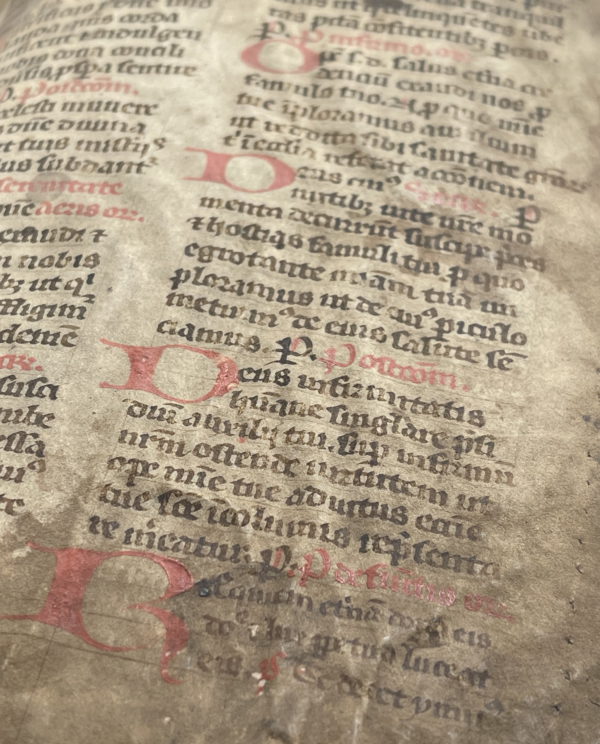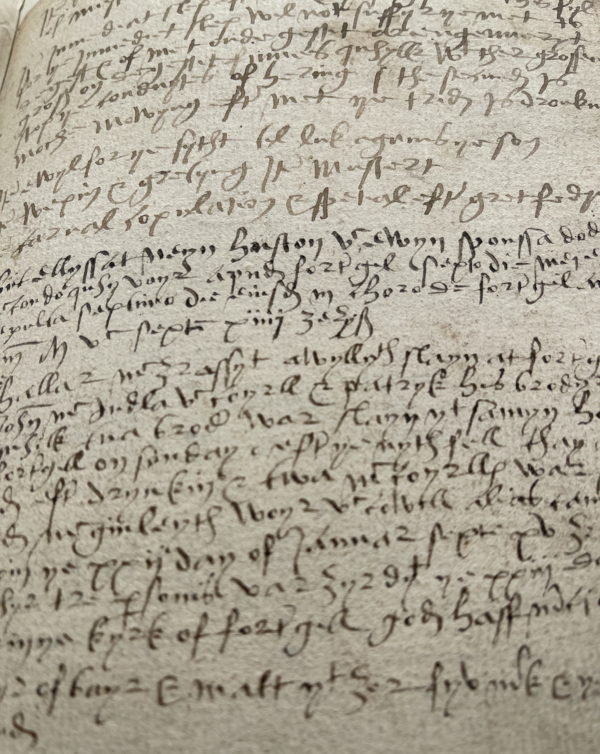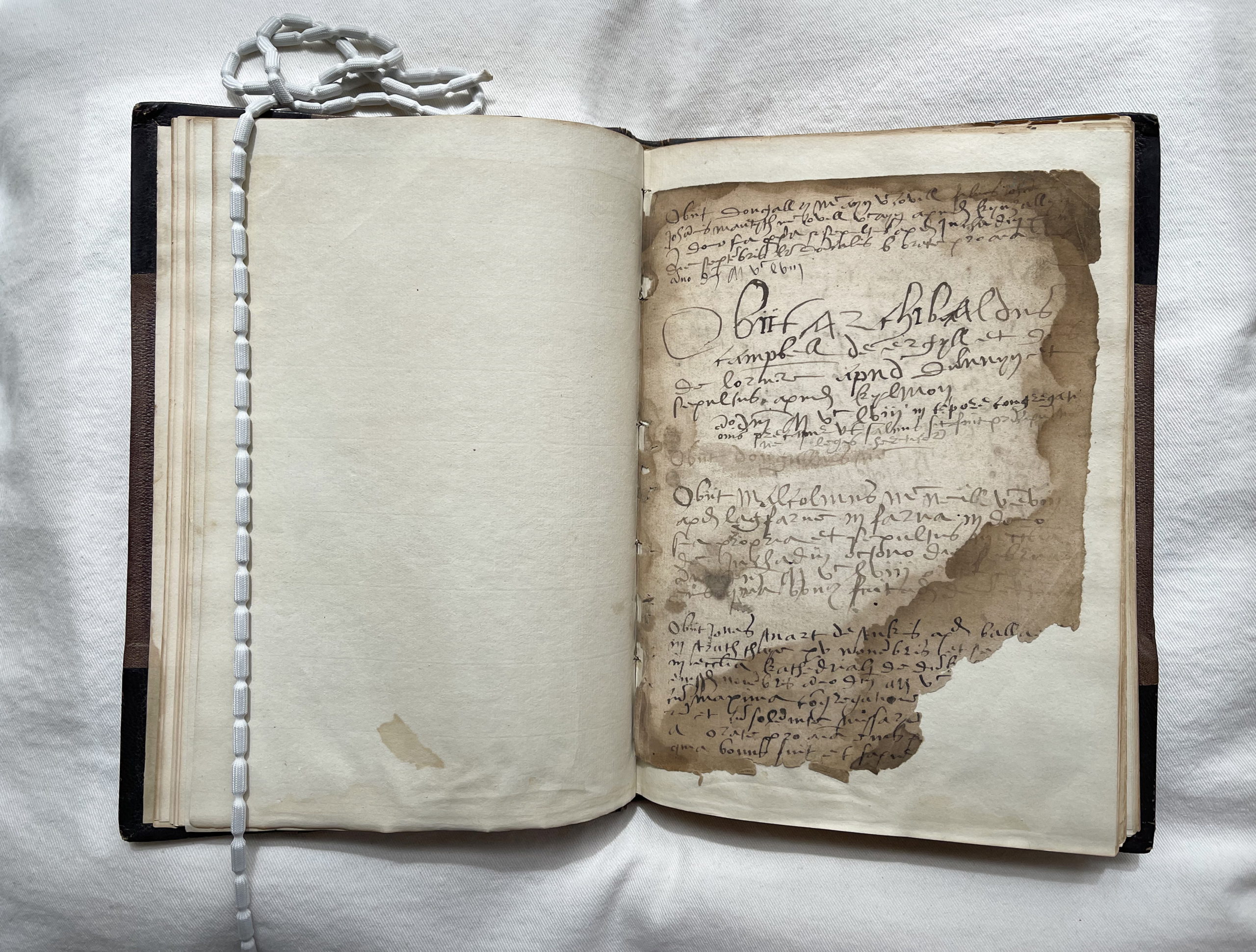The National Library of Scotland was successful in securing the manuscript known as the Chronicle of Fortingall at auction recently. Scribes compiled the manuscript between 1554 and 1579 at Fortingall in Highland Perthshire, which contains contemporary annals, poetry and other short texts in Latin, Scots and Gaelic. The scribes belonged to the MacGregor family who also compiled the slightly earlier Book of the Dean of Lismore, the earliest surviving collection of Gaelic poetry compiled in Scotland. Scholarly research and evidence shows the two manuscripts were almost certainly compiled by members of the same family.
The Library’s single most important Gaelic manuscript

Manuscripts Curator Dr Ulrike Hogg said: “We consider the Chronicle of Fortingall a partner volume to the Book of the Dean of Lismore, the Library’s single most important Gaelic manuscript and one of our greatest treasures. The two manuscripts are so closely connected that it’s difficult to describe one without reference to the other. It’s a great privilege for us to be able to bring the manuscripts together again after their compilation some 450 years ago. The Gaelic contents of the Chronicle of Fortingall make a significant addition to our Scottish Gaelic manuscripts collection, which is the largest in the world. And securing the manuscript for the national collections means we can make the contents publicly accessible and ensure its professional preservation.”
Senior Lecturer in Scottish History at the University of Glasgow, Dr Martin MacGregor, welcomed the acquisition and said: “It is a relief that the National Library was successful in securing the Chronicle of Fortingall, especially as they hold the companion volume, the Book of the Dean of Lismore. The Chronicle of Fortingall is a highly significant manuscript which provides insight into public life in the Highlands in the later Middle Ages. It is an important source for the history of the Highlands – social, political, cultural, economic and religious. It also has great linguistic importance as it embodies the interplay of Latin, Scots and Gaelic as written languages in then Gaelic-speaking Scotland.”
Breadalbane Muniments

The manuscript was compiled at Fortingall, at the mouth of Glen Lyon in Highland Perthshire, near the eastern end of Loch Tay. It is written in several hands. Compilation took place between 1554 and 1579, although it may have begun earlier. One of the compilers records that he said his first mass in 1531, began to serve the cure at the church of Fortingall in 1532, and acknowledged the chief of the MacGregors. He may be the principal compiler, and further identified with Dubhghall (Dougall) MacGregor, on record as vicar of Fortingall in 1544. The authorial perspective reveals continuing Catholic allegiance, and hostility to the Scottish Reformation brought into law in 1560.
The item is the manuscript named The Chronicle of Fortirgall by Cosmo Innes, and published by him under that name in The Black Book of Taymouth: with other papers from the Breadalbane Charter Room (T. Constable: Edinburgh 1855). At that time, it belonged with the private family papers of the Earls of Breadalbane, held at Taymouth Castle by Kenmore, at the east end of Loch Tay in Highland Perthshire. When at various points during the 20th century these papers were transferred to what is now the National Records of Scotland in Edinburgh, where they are catalogued as the Breadalbane Muniments, this manuscript was not among them. It is supposed it remained with the family until now.
Did you know?
The contents of the manuscript include:
-Lists of kings of Scots and notes on their reigns in Latin.
-A list of battles from Bannockburn (1314) to Flodden (1513), also in Latin.
-A chronicle recording the deaths of prominent men and women within the Highlands from 1390–1579, written in Latin and Scots.
-A Gaelic poem written in a writing system based on Middle Scots.
-Poetry in Middle Scots by Robert Henryson and William Dunbar.
-Verses, proverbs and aphorisms in Latin.
-Miscellaneous short prose texts in Latin and Scots covering everything from the size and divisions of Ireland to medicine and cures, religion and belief, and commentary against women and inebriation.

